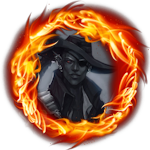источник - https://docs.google.com/document/d/1AJC … 23sjpj5u97
D&D Micro Instructions
HOW TO PLAY
At its most basic, D&D is just pretending. It's closer to being in an improv show than playing a typical board or video game. In a board game or video game you have very specific rules about what you can and can't do. There's rules in D&D too of course, but the options are MUCH more open-ended.
Essentially, you pretend to be whoever your character is and imagine what it is they would do in a given situation. You tell the dungeon master (DM) what it is you're doing and saying (literally anything you want) and the DM decides the outcome via black magic and secret arcane trickery. Or just by being on the spectrum and knowing a ton of obscure rules.
Pretty much anytime you try and do something, be it attacking someone, persuading an innkeeper for a free room, attempting to do a perfect cartwheel, whatever...99% of the time what it comes down to is you roll a d20 (a 20-sided die) and add some sort of modifier to it. The modifier depends on your core abilities (Strength, Dexterity, Constitution, Intelligence, Wisdom, Charisma). I then compare your roll to some target called a Difficulty Check (DC). The value of the DC is unknown to you and it changes depending on the situation. All you need to worry about is telling me what the value of your roll was and I tell you if you succeed or fail.
That's the boring math part. Everything else is just like being in a play but you don't have the script. We all make it up as we go along.
COMBAT
On each of your turns in combat you can do the following:
Move up to your full speed (in feet)
Perform an “action” (detailed below)
Perform a “bonus action” if you have one. The bonus actions your character can do are different for everyone. You might not have any. They’re usually spells or some other special ability.
Regarding “moving”, you can split that up in your turn however you like. If you’re able to move 30’ per turn, you can move 10’, perform an action, move another 15’, perform a bonus action (if you have any), then move your last 5’.
Combat Actions
The combat actions you can perform are:
Attack
Cast a spell
Dash. This means instead of doing some other action, you can instead choose to move your full move speed again. If your speed is 30, you can instead move 60.
Disengage. Instead of attacking or doing some other more standard action, you can choose to take evasive action so your movement away from an enemy doesn’t provoke an opportunity attack (discussed lower down).
Dodge. You focus entirely on avoiding attacks. Until your next turn any attack made against you is done with disadvantage.
Help. Pretty ambiguous, but just means you do something in some way to “help” someone else giving them advantage in something they’re doing. For instance, if one of your allies is attempting to attack someone, you can say you’re “helping” by doing a distracting dance with your pants down and a celery stick up your ass. Your ally would get advantage on their attack.
Hide. You can try and hide from an enemy, but doing so while in combat is usually next to impossible. Most people can’t hide if they’ve already been noticed. There are exceptions for certain classes or races (Rogues, small nimble races like Halflings, etc…). However, if it’s been made clear in some way that the enemy is otherwise completely distracted or maybe temporarily blinded, then yes, you can attempt to hide even though you’ve already been noticed.
Search. The enemy has disarmed you and thrown your favourite sword into the nearby bushes. Instead of switching to another weapon you might want to “search” for your sword. Not typically an action done while in combat, but it’s there as an option.
Use an object. The enemy’s at the gates! You need to operate the drawbridge wheel to keep them from getting in. For example. Or...you’re in the midst of combat and you’re at death’s door. You might choose to use your turn to drink a healing potion.
Ready. Instead of taking your turn immediately you can instead sort of delay your action and take it later on in the turn order based on a specific trigger. For example, “I’m gonna wait for that evil wizard to step on the trapdoor. If he does, I’m going to pull the lever”. Your turn basically interrupts someone else’s turn. It’s a handy “if this then that” kind of mechanic, but the risk is if the “trigger” doesn’t happen then you’ve basically wasted your turn.
Wait. You can decide to move yourself lower down in the turn order. The main difference between Wait and Ready is that your place in the turn order will permanently be lower down, but at least you’ll be guaranteed to still get your turn this round.
Opportunity Attacks
In combat, everyone’s always looking for an opening, waiting for someone to drop their guard. At any point, if an enemy is within melee range of you (5’) and they move away from you, either because they’re fleeing or they’re just moving to attack someone else, you get to make an opportunity attack. This means even though it’s not your turn you get to make an extra attack on that enemy. This cuts both ways though. If you’re within melee range and you run off, the enemy gets an opportunity attack on you.
Ranged Attacks in Close Combat
It’s difficult to use a bow and arrow when someone’s right on top of you. If someone is within melee range of you, any ranged attacks you make (including ranged spells) are made with disadvantage.
Cover
You can often take advantage of taking cover behind stuff. There are three degrees of cover:
Half cover. A low wall or piece of furniture for example. You get +2 to your AC.
¾ cover. A thick tree for example. You get +5 to AC.
Full cover. You’re completely obscured by something. You can’t be targeted by an attack or spell.
Rolling 1 or 20
If you roll a natural 1 on the die, meaning the die itself shows a 1 despite any sort of modifiers you have that would normally change the outcome of that roll, it’s called a Critical Miss. No matter what, you miss, and sometimes something unfortunate might happen.
If you roll a natural 20 you automatically hit even if the enemy’s AC is higher than 20. It’s also a Critical Hit meaning you deal extra damage.
Dropping to Zero Hit Points
Dropping to zero doesn’t necessarily mean instant death, but you are knocked out and dying. On each turn after the one where you dropped to zero you make a death savings throw. You roll a d20. On a 10 or higher it’s a success. On 9 or lower it’s a failure. You continue doing this on each of your subsequent turns keeping track of how many successes and failures you have. If you reach 3 successes before you reach 3 failures you’re “stabilized”. This means you’re still unconscious and at zero HP, but alive. If instead you reach 3 failures, you ded.
A roll of 1 counts as 2 failures. A roll of 20 counts as you immediately healing 1hp.
Also, any time someone attacks you while you’re at zero HP counts as another failure.
You can immediately be stabilized if someone else makes a successful Medecine check to try and stabilize you.
Instant Death
Massive damage kills you instantly. If you take damage that reduces you to zero, and the remaining damage is greater than or equal to your max HP, you die instantly. No death savings throws. You can’t survive a mountain falling on you.
Knocking a Creature Out
When reducing an enemy’s hit points to zero, instead of killing it, you can decide to say you’re knocking it out. Useful if you want to interrogate someone. This has to be done with a melee attack though. You can’t knock someone out with an arrow.
SKILL CHECKS
In addition to your weapons and inventory items, your Skills are your most valuable assets. You should think of them as being part of your bag of tricks. At any point you can ask to “make a bla bla bla check”. Each of your core 6 abilities (Strength, Dexterity, etc...) are broken up into a subset of specific Skills. If you’re “proficient” in a particular skill it just means you get a bit of a bonus to your rolls. If you’re not proficient in said skill it doesn’t mean you can’t try and attempt something with that skill, it just means the check would default to whatever the parent ability’s score is. So if you’re trying to make an Athletics check and you’re not proficient in Athletics, then it’s just a regular Strength check.
Below are some hypothetical situations you might ask to make a specific Skill check.
STRENGTH
Athletics. You need to climb a slippery surface, struggle to swim in fast-moving water, or try to jump an unusually long distance.
DEXTERITY
Acrobatics. You’re falling and want to see if you can land on your feet. You’re trying to balance on a narrow ledge.
Sleight of hand. You want to pickpocket someone, or maybe try and cheat at a card game.
Stealth. You want to be very very sneaky.
CONSTITUTION
There’s no specific Skills under Constitution. Rather, you would make a general Constitution check for things like: trying to go without sleep, trying to chug a beer faster than the other guy, avoiding getting drunk, seeing if that spicy enchilada gives you the runs, etc…
INTELLIGENCE
Arcana. You see some sort of magical artifact and try to recall some information about it. Someone’s performing a magic ritual, do you know what that ritual is for?
History. Someone mentions some historical figure or event, do you know anything about it?
Investigation. You have a bunch of clues in front of you. Are you able to piece them together to make an accurate deduction.
Nature. How much do you know about local fauna, terrain, etc…
Religion. A cult is performing a ceremony. Based on what they’re wearing or what ceremony they’re performing, can you deduce what god they’re praying to?
WISDOM
Animal Handling. The horse you’re riding gets spooked. Can you keep it calm enough to avoid getting bucked off? A wild animal is snarling at you. Can you try and tame it?
Insight. I got a bad feeling about the info this guy is feeding me. Can I read his body language and mannerisms well enough to know if he’s lying?
Medicine. Can you properly diagnose an illness? More importantly, one of your allies has been knocked out and is dying. Can you stabilize them?
Perception. You’re looking around for hidden traps, secret doors, etc…
Survival. You’re out in the wilderness and need to forage for food. You see some footprints, can you track them accurately? There’s a big storm cloud on the horizon. Is it going to dissipate before it reaches you?
CHARISMA
Deception. “Yeah, I totally know the king. Me and him go way back. You should let me in to see him. Also, my dick reaches the floor.”
Intimidation. “If you don’t let me through I’ll gouge your eyes out with my thumbs!!!”
Performance. You’re trying to pretend you’re someone you’re not. Or maybe you’re performing for a crowd. Do they love you?
Persuasion. “If you give me a better price on that ring I’ll totally make it worth your while”, you whisper seductively.














